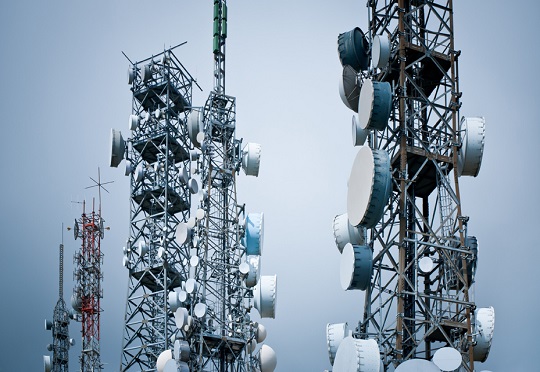Featured
Telecoms attracts $105m inflow as sector contributes N2.3trn to Q2 GDP
Published
5 years agoon

Recent key economic reports by the National Bureau of Statistics (NBS) have further underscored the notion that the telecoms sector of the Nigerian economy is crucial to the prosperity of the country.
The gross domestic domestic (GDP) report for the second quarter of 2020 and capital importation report for the same period released on Friday by the bureau have given credence to this claim.
Read Also:
First, it was the GDP report that revealed that despite the economic impact of the COVID-19 pandemic which, alongside other socio-economic contradictions, caused the economy to shrink by 6.10 per cent in Q2, the telecoms sector remained resilient.
Specifically, it was gathered that the telecoms subsector of the Information and Communications Technology (ICT) sector contributed N2.3 trillion or 14.30 per cent to the GDP in the Q2 period.

Available data show that the contribution of the sector translates to N2.272 trillion, up from N1.821 trillion in the first quarter of the year, growing by 31.43 per cent in the Q2 period.
The GDP report showed that while the entire ICT industry recorded 17.83 per cent in the second quarter, the 14.30 per cent contribution of the telecoms sub-sector was unprecedented, far and above oil and gas, and other non-oil sectors’.
Data obtained from the telecoms industry regulator, the Nigerian Communications Commission (NCC),have also shown progressive movements in the contribution of the sector to the economy as well as major indicators that measures growth within the sector itself.
For instance, the telecoms sector’s contribution has moved to what is it today from 7.70 per cent, 7.40 per cent, 7.60 per cent, 8.80 per cent, 9.13 per cent and 8.66 per cent in 2012, 2013, 2014, 2015, 2016 and 2017 respectively.
Similarly, it has further improved from 10.43 per cent in Q2, 2018 to 11.39 per cent in Q2, 2019 to reach the current unprecedented height of 14.30 per cent as at the end of Q2, 2020.
In another light, the sector also posted impressive posture in terms of capital importation in the second quarter of 2020.
While the NBS in its latest report puts the total value of foreign capital that found its way into the country through the telecoms sector at $105.64 million, the figure represents 8.16 per cent of total sum of $1.24 billion foreign capital that entered the country in the period under review.
Experts in the sector have explained that the developments were not unexpected as telecoms services have continued to find more applications in everyday life of the people, and has indeed has become the driver other sectors in this pandemic period.
In addition, telecoms operators under the aegis of the Association of Telecommunications Companies of Nigeria (ATCON) have ascribed the positive stories of the sector to good regulatory standard of the NCC and some government-led initiatives to remove some of the obstacles bedeviling the sector.
Corroborating this, Umar Danbatta, the executive vice chairman (EVC) of the NCC has said that while the pandemic and lockdown were taking tolls, the commission embarked on some initiatives to prevent service breakdown as more people continued to join networks of operators.
Citing an International Telecommunications Union (ITU) report, the EVC said with the pandemic, some telecom operators and platforms are reporting demand spike, especially in data usage and volume of calls, as high as 800 per cent since the outbreak of the pandemic.

Regardless of this, Danbatta said the commission and the mobile network operators needed to play their roles in sustaining quality of service delivery and quality of experience by the consumers, who are critical stakeholders in the telecoms sector.
He said the NCC, in conjunction with the supervising ministry developed e-platforms to handle all requests from the licensees to ensure that regulatory services are provided to sustain service delivery to subscribers.
He said the commission also approved and encouraged resource sharing among network operators and secured Right of Passage (RoP) for all telecommunications companies and suppliers for easy movement during the lockdown.
These measures, according to him, enabled the operators to service their base stations and ensured seamless services for telecom consumers who increasingly relied on the networks during the pandemic.
Danbatta further stated that the NCC, working with the ministry is resolving the problem of high cost of Right of Way (RoW) with the Nigerian Governors Forum (NGF), adding that, through such engagements, the state governors have lent their support for a robust broadband infrastructure.
“The commission is hopeful that with the reduction in RoW, which will automatically result in reduction in capital expenditure (CAPEX) by the network operators, telecom companies will sooner than later reciprocate the gesture by making their services more affordable to Nigerians,” he said.
Share this:
- Click to share on X (Opens in new window) X
- Click to share on Facebook (Opens in new window) Facebook
- Click to share on WhatsApp (Opens in new window) WhatsApp
- Click to share on Pocket (Opens in new window) Pocket
- Click to share on Telegram (Opens in new window) Telegram
- Click to email a link to a friend (Opens in new window) Email
- Click to share on LinkedIn (Opens in new window) LinkedIn
You may like


NCC Committed to Regional Digital Integration – Maida


Telcos to Pump Fresh N1.4 Trillion on Network Expansion – NCC


NCC to Rollout Satellite-to-Phone Technology for 23.3m Nigerians


NCC, CBN Introduce 30-Second Refund Rule for Failed Airtime and Data Purchases


NCC Seeks Stakeholder Input on Draft Five-year Spectrum Roadmap, 60 ghz Guidelines


Nigeria’s Active Telecom Subscribers Hit 173.5m as Broadband Penetration Nears 50%












